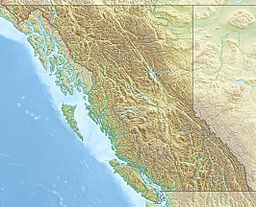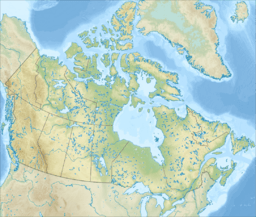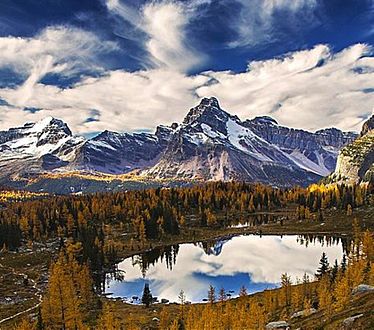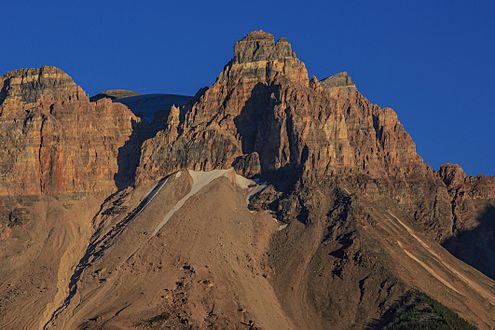Cathedral Mountain (Yoho) facts for kids
Quick facts for kids Cathedral Mountain |
|
|---|---|
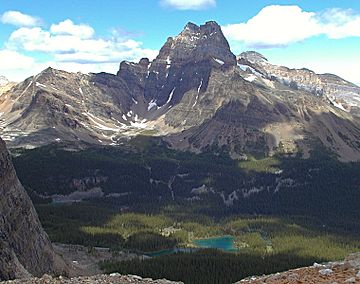
Cathedral Mountain
|
|
| Highest point | |
| Elevation | 3,189 m (10,463 ft) |
| Prominence | 467 m (1,532 ft) |
| Parent peak | Mount Stephen (3199 m) |
| Listing | Mountains of British Columbia |
| Geography | |
| Location | British Columbia, Canada |
| Parent range | Canadian Rockies |
| Topo map | NTS 82N08 |
| Geology | |
| Age of rock | Cambrian |
| Type of rock | sedimentary rock |
| Climbing | |
| First ascent | 1901 James Outram, Joseph Bossoney, and Christian Klucker (guide) |
Cathedral Mountain is a huge mountain in Yoho National Park, British Columbia, Canada. It stands about 3,189 meters (10,463 feet) tall. This mountain is part of the Canadian Rockies. It's located about six kilometers northwest of Lake O'Hara.
The mountain's shape looks a lot like a grand gothic cathedral. This unique look has inspired many artists. For example, Arthur Lismer, a famous Canadian artist, painted it in 1928. You can easily see this beautiful mountain from Highway 1. This road is also known as the Trans-Canada Highway, especially near Kicking Horse Pass. The mountain's closest taller neighbor is Mount Stephen, which is about 3 kilometers (1.9 miles) to the west.
Contents
Mountain's Name and First Climbers
The name Cathedral Mountain was first used around 1884. It even appeared on a map made by George Mercer Dawson in 1886. The name became official in 1924. This happened when the Geographical Names Board of Canada approved it.
The first time someone successfully climbed to the top of Cathedral Mountain was in 1901. A climber named James Outram led this climb. He was joined by two guides, Joseph Bossoney and Christian Klucker.
How the Mountain Formed
Cathedral Mountain is made of sedimentary rock. This type of rock forms from layers of sand, mud, and tiny bits of sea creatures. These layers were laid down over millions of years in ancient shallow seas.
Later, huge forces inside the Earth pushed these rock layers. This movement caused the rocks to fold and lift up. This is how the mountain we see today was created.
Weather at Cathedral Mountain
The weather around Cathedral Mountain is known as a subarctic climate. This means it has very cold winters with lots of snow. The summers are usually mild. Temperatures can drop below -20 °C (-4 °F). With the wind, it can feel even colder, sometimes below -30 °C (-22 °F).
When snow and ice melt, the water flows off Cathedral Mountain. This water eventually drains into the Kicking Horse River. The Kicking Horse River then flows into the larger Columbia River.
Cathedral Crags
The Cathedral Crags are sharp, rocky peaks. They stand about 3,082 meters (10,112 feet) tall. These crags are located about one kilometer northwest of the main Cathedral Mountain summit. They have steep, reddish cliffs. You can see them near Kicking Horse Pass and the Spiral Tunnels Viewpoint.
The Cathedral Crags were first climbed in 1900. This was done by James Outram and W. Outram. Their guide was Christian Hasler Sr. The name "Cathedral Crags" was officially adopted in 1952.
Gallery
 | Selma Burke |
 | Pauline Powell Burns |
 | Frederick J. Brown |
 | Robert Blackburn |


